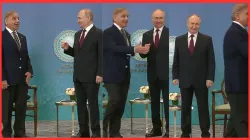SCO Summit: Pakistan PM Sharif's awkward moment with Putin, calls him expanding 'barter trade' I Viral video
During a photo opportunity with Putin, the Pakistani PM enthusiastically interrupted to greet Russian Foreign Minister Sergey Lavrov. The video, which was humorous, quickly went viral on social media platforms.

Pakistan Prime Minister Shehbaz Sharif and Russian President Vladimir Putin have a history of awkward moments at the Shanghai Cooperation Organisation (SCO) Summit. On Wednesday, when both leaders met on the sidelines of the grand event in Kazakhstan's national capital, Astana, they again had an embarrassing moment.
VIDEO: Shehbaz Sharif's awkward moment with Putin
The Pakistani PM joyfully interrupted a photo opportunity with Putin to greet Russian Foreign Minister Sergey Lavrov. The video which appeared funny went viral on social media platforms. Notably, this was not the first time when Sharif had such a gaffe at such a high-profile event. When he met at the SCO Summit in 2022, the Pakistan Prime Minister was seen struggling with a translator earpiece.
At the beginning of the meeting, Sharif failed to put the earpiece in place before asking for help. "Can somebody help me," asked the prime minister. This triggered a burst of audible laughter from the Russian president.
Shehbaz Sharif calls for "barter system"
Interestingly, this was not the only case of a giggle at the SCO Summit on Wednesday. During the meeting, Sharif thanked the Russian government for sending an oil shipment to Pakistan in the recent past and expressed the desire to move further in this regard.
He offered a barter system to the Russian President. He recalled the barter trade between the two countries during the decades of 50s to 70s when Pakistan used to import machinery from Russia and export leather and other commodities to Russia, ARY News reported. It is interesting to note that the bilateral trade between the two nations stood at only $1 billion.
During his televised opening remarks at the meeting, the prime minister mentioned that bilateral trade currently stands at approximately $1 billion and highlighted the potential for expansion by addressing financial and banking issues.